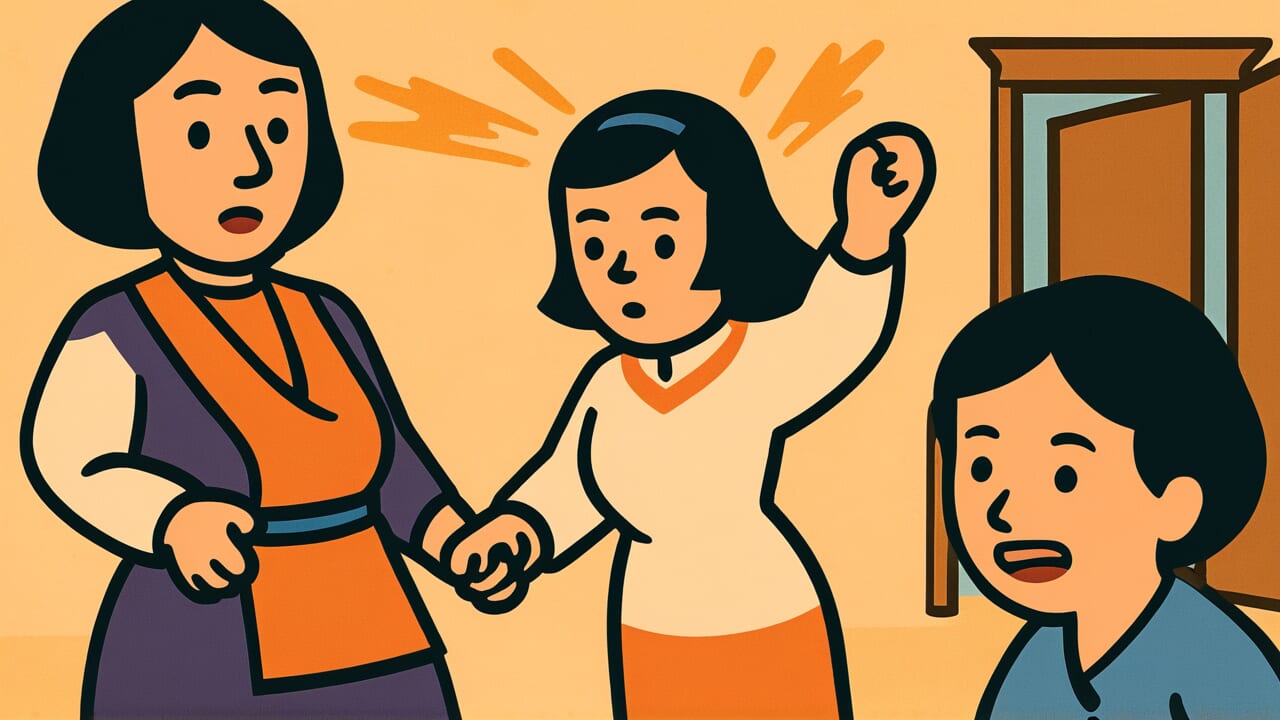How to Read “The daughter-in-law avenges the mother-in-law”
Shūtome no kataki wo yome ga utsu
Meaning of “The daughter-in-law avenges the mother-in-law”
“The daughter-in-law avenges the mother-in-law” means that someone unrelated to the original conflict takes revenge on behalf of another person.
It describes situations where a third party with no direct stake in the matter carries out retaliation that should have been done by the person who was wronged.
This proverb is used when you receive unexpected retaliation from someone you didn’t directly harm. Instead of facing consequences from the person you wronged, you get payback from someone connected to them.
It also applies when a third party seeks revenge out of loyalty or human compassion, acting on behalf of the original victim.
In modern contexts, this proverb describes business or personal situations where you face unexpected backlash from someone who wasn’t directly involved.
For example, when you treat someone poorly, you might receive criticism or retaliation not from that person, but from their associates or friends.
Origin and Etymology
No clear written records explain the exact origin of this proverb. However, we can make interesting observations from how the phrase is constructed.
Let’s focus on the relationship between “mother-in-law” and “daughter-in-law.” In traditional Japanese family systems, these two had no direct blood relationship.
The daughter-in-law lived with her husband’s mother but shared no blood ties with her. This “non-blood relationship” is deeply connected to the core meaning of this proverb.
The phrase “avenges” reflects the revenge culture of samurai society. During the Edo period, avenging one’s parent or lord was considered virtuous.
Many stories and plays featured such revenge tales. However, this proverb presents a mother-in-law’s revenge carried out by a daughter-in-law—a relationship with no direct obligation.
In other words, the proverb uses the most understandable family metaphor to express a situation where someone with no duty to seek revenge does so anyway.
The combination of mother-in-law and daughter-in-law, who share no blood, effectively conveys the meaning of “someone unrelated taking revenge on another’s behalf.”
Usage Examples
- When we dealt dishonestly with that company, it was like “the daughter-in-law avenges the mother-in-law”—their affiliated companies canceled contracts with us
- Because he mistreated a former employee, it’s like “the daughter-in-law avenges the mother-in-law”—that person’s friends are spreading bad rumors about him throughout the industry
Universal Wisdom
“The daughter-in-law avenges the mother-in-law” offers deep insight into the invisible networks of human relationships and the chain of loyalty and emotions that flows through them.
We often act by looking only at the person directly in front of us. However, no one exists in isolation.
Behind each person spreads a vast network of family, friends, colleagues, and companions. When you wrong someone, the impact doesn’t stop with that individual.
It ripples outward to touch the hearts of everyone who cares about them.
This proverb has endured because it captures the essence of “solidarity” in human society.
Even without blood ties or direct interests, people will stand up for others. This comes from loyalty, compassion, and a sense of justice.
Even when the wound isn’t your own, you feel the pain when someone you care about is hurt. This is empathy—a uniquely human capacity.
At the same time, this proverb serves as a warning. Your actions are seen and remembered by far more people than you realize.
When AI Hears This
This proverb demonstrates an extreme example of what game theory calls a “commitment device.” A commitment device is a mechanism that forcibly binds your actions.
For instance, burning your ships to cut off retreat forces soldiers to think “we have no choice but to fight.”
The mother-in-law and daughter-in-law relationship represents the “highest trust cost combination”—no blood ties and naturally conflicting interests.
But when the social norm of revenge enters the picture, everything changes. The daughter-in-law must fulfill her promise to avenge the mother-in-law, staking her own life.
In that era’s society, abandoning revenge meant losing the entire family’s honor.
What’s fascinating is that the mother-in-law herself cannot monitor compliance. Since the daughter-in-law acts after the mother-in-law’s death, they cannot verify fulfillment like a normal contract.
Instead, everyone around them becomes a monitor and evaluator. “Society as a whole” functions as the enforcement mechanism.
This structure resembles blockchain’s distributed verification. Even without a central administrator, multiple participants sharing records guarantee promise fulfillment.
The social system artificially created bonds stronger than blood ties.
Lessons for Today
This proverb teaches modern people the importance of being mindful of “invisible connections” in human relationships.
In today’s world, connections between people are more complex than ever through social media and business networks.
When you act dishonestly toward someone, the impact may spread far wider than you expect.
Even if the direct party says nothing, people around them are watching and judging your behavior.
However, this isn’t something to fear. You can view it positively instead.
When you show kindness to someone, that goodwill also spreads to those around them. Valuing one person builds trust with the many people who care about them.
What matters is the ability to imagine not just the person in front of you, but the network of relationships behind them.
Each action reaches someone’s heart in ways you cannot see. With this awareness, sincerity naturally emerges in your daily conduct.



Comments